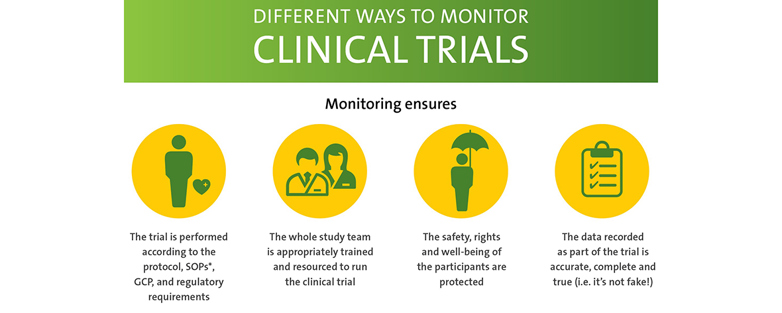Monitoring

Good trial monitoring, auditing and inspection activities identify issues that matter (important deviations from the protocol or unexpected issues that threaten to undermine the reliability of results or protection of participants’ rights and well-being) and provide an opportunity to further improve quality (for example, through modifications to the protocol and procedures, training and mentoring of staff, or information provided to participants).
Monitoring occurs at various points throughout a research project. It usually starts at the Site Initiation Visit (or equivalent), and will continue until the last participants has completed all protocol-specific procedures and evaluations (including follow-up). The exact frequency of monitoring visits during the study will be documented in the Sponsor’s study-specific Clinical Monitoring Plan.
Depending on the risk profile of your research, your external Sponsor will judge whether on-site monitoring, remote monitoring, or a combination of the two is appropriate.
On-site monitoring means Sponsor representatives will come on site, in person, to perform their monitoring activities. Remote monitoring means that Sponsor representatives conduct the same (or similar) monitoring activities using online platforms (such as eISF platforms).
The Monitors must liaise with the site team to schedule the visit, set up a time to meet with key team members including CPI/PI, arrange access (in accordance with each institution’s policies) to the relevant systems and notify site staff of the required documents for the visit. See MCTC046 SOP| Monitoring Visit Activities for Clinical Trials of Investigational Products for more detailed information on monitoring and monitoring visits.
Access to records - Who can? How can they?
Participants must be informed, as part of the informed consent process, about who can access their records and identifiable information during and after the study. This will include any representatives from your external Sponsor conducting monitoring activities.
Melbourne Children’s has standard wording for inclusion in informed consent forms for this:
“These people may access your child’s identifiable information:
· research team involved with this project, who will come from [The Royal Children's Hospital / Murdoch Children's Research Institute / other]
· RCH Human Research Ethics Committee
· [name of sponsor] and/or [name of CRO/Sponsor delegate]
· [Therapeutic Goods Administration], and other regulatory agencies
· [insert any other relevant parties]"
You can find the standard wordings, and other resources at Research Governance and Ethics: Plain Language Resources.
· Parkville connect instructions
-
-
- Terms of Use
- Instructions for use
-
At Melbourne Children’s, monitor access to relevant systems is managed through Parkville Connect. Your monitor will need to register for a Parkville Connect account, and agree to the Terms of Use before their first monitoring visit. This takes on average three weeks.
Find resources about this process, and access the system here:
· Parkville Connect: About Parkville Connect
· MCTC073 Factsheet | Access Parkville Connect for Trial Monitoring
Another common quality control activity is the use of an independent (and therefore unbiased), multidisciplinary, committee tasked with monitoring the safety and efficacy of a study, through a comprehensive and regular review of study data. This committee can be called a Data Safety and Monitoring Board (DSMB), a Data Monitoring Committee (DMC), a Data and Safety Monitoring Committee (DSMC), Safety Monitoring Committee (SMC), or something else altogether.
This committee will be stood up and managed by your external Sponsor. They will make regular recommendations as a result of their review, and your Sponsor will send these recommendations on to you, along with any expected actions as a result of them.




